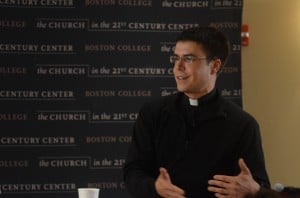@KofC epic #selfie #PopeFrancis pic.twitter.com/CLYduUpxDA
— Fabio M. Ragona (@FabioMRagona) August 29, 2013
Most if not all of us have seen the selfies with Pope Francis, which are arguably the most popular example of how much he is in touch with what’s going on in the world. He feels “real” in that way, but his realness goes beyond delightful spontaneity. He keeps it real in a more profound way. I think that his realness, in particular, isn’t just a matter of personal charisma, but a result of a basic element of Ignatian spirituality and Jesuit prayer: the Examen.
Life keeps us so occupied that we rarely think about reflecting on our experiences. We let life go by right in front of our eyes, like the scenery on a train ride. When this happens, we neglect the quality of our experiences. Instead, we begin relying on what theoretically make sense, or what merely feels good. I can travel around the world and post photos on my Facebook account, but I do not reflect on how I have been moved by these experiences, or what it means for me. I become disconnected from the reality in which I live. This is especially so in the life of faith. Going to retreats and conferences to enrich my faith is easy; so is keeping them as theories in my head and not allowing them to challenge me day-by-day.
St. Ignatius does not want us to find God in our theoretical world; he wants us to find God in the real world in which we live. That is why he proposes to us a kind of prayerful reflection called the Examen prayer, in which we examine how our lives are being drawn to or away from God. So important is the prayer, St. Ignatius demands that Jesuits not miss it, come hell or high water.
Examining our lives is like looking in a mirror. We see ourselves, and we tend to pick out the flaws and imperfections. I am impatient. I am insecure and subconsciously seek attention from others. I swear too (darn) much. As much as we wouldn’t like to have it, our lives are messy, and we often do not want to face up to our failures. We don’t like how we look. More importantly, we think that God does not like how we look. We doubt the mercy of God on us. Consequently, we also doubt God’s mercy on others, and the rest of the world, who are just as messy as we.
The beauty of the Examen prayer is that not only do we see our imperfections, but we also see how God blesses us, loves us and draws us to him in concrete ways. The gratuity of a friend’s hug, good conversations that make us better persons, the hard lessons that are learned through mistakes, and so on. This is the reality that we find in our lives. We no longer need to worry about whether God really loves us or not. We can face up to our shadows without being swallowed up by hopelessness. The Examen prayer keeps us honest, and keeps our lives real. This allows us to see and deal with others and the world as they truly are.
Pope Francis is an example of keeping it real in an Ignatian way. First of all, he is real with himself. In that famous interview from 2013 — the one where he answered “Who is Jorge Mario Bergoglio?” with “I am a sinner” — he showed a great self-understanding by remarking how he has learned from his authoritarian way of making decisions during his time as the Jesuit provincial superior. In the same interview, he insisted that we see those with same-sex attractions as people worthy of love and respect, and that we approach them as such. He sees other people the way the Examen challenges us to see ourselves: not ignoring their challenges and struggles, but seeing them from the perspective of gratitude and love. The courage and freedom to look at the real world and real people without blinking comes from first looking at it with love.
It is with the same attitude that he sees the happenings in the world. He called the Extraordinary Synod on the Family that will convene next month, which will look at the challenges of evangelizing the family in the twenty-first century. There is no beating around the bush with this synod, either: complex pastoral situations will be considered, such as divorced families, living together before marriage, and how to catechize children in same-sex unions.
His willingness to tackle the imperfect but real part of himself, others, and the world with love is a clear sign that he has been formed by the spirit of the Examen prayer. This is what I find the most attractive about him, and not just the mere fact that he is a Jesuit. If there is ever a call to “be like Francis”, it should be translated into “be your real self”. Looking at the lens of a cell phone camera may result in a nice selfie, but it is much more rewarding to look at ourselves, others and the world through the lens of the Examen prayer.












